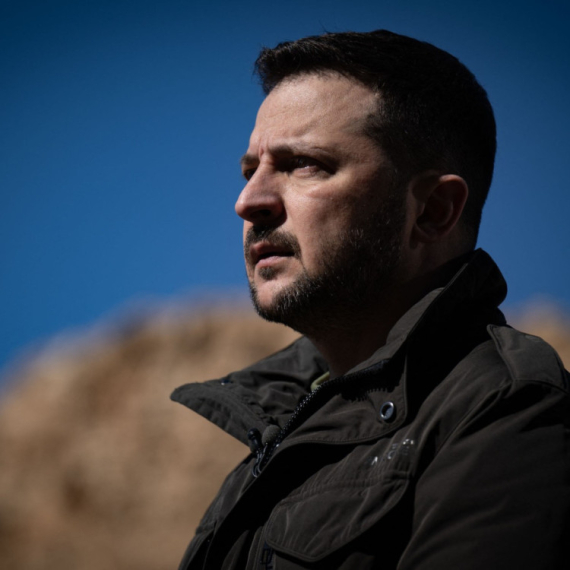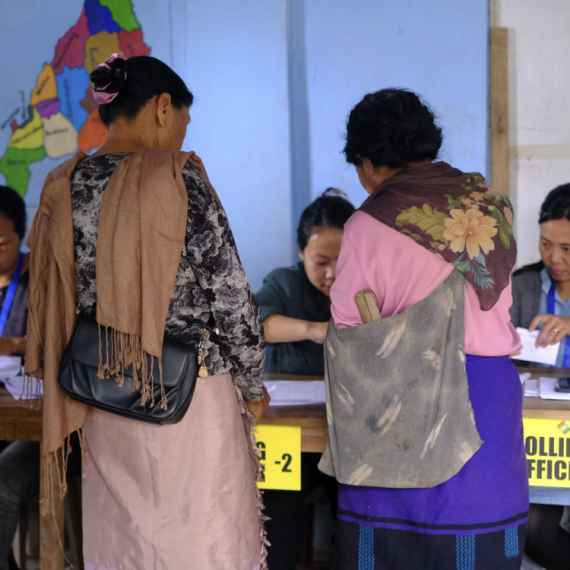Visa abolition looking increasingly likely
Foreign Minister Vuk Jeremić and EU Enlargement Commissioner Olli Rehn expect the visa regime for Serbian citizens to be lifted this year.
Thursday, 11.06.2009.
09:27

Foreign Minister Vuk Jeremic and EU Enlargement Commissioner Olli Rehn expect the visa regime for Serbian citizens to be lifted this year. The Dutch parliament's Foreign Affairs Committee has come out in support of visa liberalization at its meeting today. Visa abolition looking increasingly likely “I hope the European Commission will give a recommendation for the abolishment of visas before the summer break,“ Rehn said. According to him, Serbia had been a constructive, active and reliable partner in the fulfillment of obligations stemming from the Road Map for visa liberalization. He said that certain technical issues, such as the issuing of passports, would be the topic of the Friday meeting between European Commission representatives and Serbian officials. Jeremic reiterated Serbia's readiness to continue pursuing its European course. “EU membership is our strategic goal and we will continue to make efforts in that respect, regardless of the difficulties we are faced with,“ he said. “This process is valid, our institutions are working hard to meet the required criteria,“ the Serbian foreign minister added. “One of the issues which was raised last time was the efficiency of our parliament, and now this body has become one of the most efficient institutions in our country,“ Jeremic underlined, adding that all the institutions in Serbia took the priority of EU integration very seriously. Speaking in Strasbourg, Jeremic called on the EU Council of Ministers to scrap visas for West Balkan citizens as soon as possible, adding that Serbia had met all the conditions. Underlining that restricting travel around Europe in today’s climate was unjustifiable, the minister said that one could not have “second-class European citizens, nor discrimination between those who could travel freely and those who can’t.” Interior Minister Ivica Dacic, speaking in Germany where he received the news that the EC could give the green light in July, said: "Germany will not oppose the EC’s position. Germany wholeheartedly supports visa liberalization for Serbian citizens and I want to convey [German Interior] Minister [Wolfgang] Schaubl’s conviction that the EC will take a decision in early July that will certainly be to the benefit of Serbian citizens.” Serbia also has France’s support when it comes to scrapping visas, Deputy Prime Minister Bozidar Djelic said. Vuk Jeremic, Olli Rehn (Beta, archive) Dutch thumbs-up The Dutch parliament’s Foreign Affairs Committee has supported the government’s readiness to consider the issue of visa liberalization for Serbian citizens, though the government continues to insist on full cooperation with the Hague Tribunal before Serbia can continue its EU path. This is the position—confirmed at today’s committee meeting—that the Dutch will adopt at the upcoming ministerial conference on June 15/16 and the EU summit in Luxembourg on June 19. According to the government document that was under discussion today, which was outlined by Dutch Foreign Minister Maxime Verhagen, Hague Chief Prosecutor Serge Brammertz’s report to the UN Security Council did not state that Serbia was fully cooperating with the Tribunal, but that progress had been made. The Dutch government states that it is aware that the vast majority of EU member-states believed that Serbia should be assisted even before Brammertz’s report of June 4, and that Holland and Belgium were expected to fall into line with the majority following the prosecutor’s appraisal. Noting that, for Holland, Brammertz’s appraisal “is an important element in deciding about developing relations” between Serbia and the EU, Verhagen made it clear, however, that ratification of the Stabilization and Association Agreement would be approved only once Brammertz reported that full cooperation had been achieved. The Dutch government does though voice its readiness for “other forms of cooperation between Serbia and the EU,” highlighting the possibility of visa abolition, “given that Serbia may meet all the technical criteria, and given the importance Serbia attaches to visa liberalization as a positive signal to its population.” By full cooperation with the Hague Tribunal, Brammertz and the Dutch and Belgian authorities have in mind, above all, the arrest of Ratko Mladic, accused of genocide against Bosnian Muslims in Srebrenica and other parts of the country between 1992 and 1995. Holland and Belgium are the only EU countries that insist on full cooperation as a prerequisite for Brussels unfreezing the Stabilization and Association Agreement that Serbia signed last year.
Visa abolition looking increasingly likely
“I hope the European Commission will give a recommendation for the abolishment of visas before the summer break,“ Rehn said.According to him, Serbia had been a constructive, active and reliable partner in the fulfillment of obligations stemming from the Road Map for visa liberalization.
He said that certain technical issues, such as the issuing of passports, would be the topic of the Friday meeting between European Commission representatives and Serbian officials.
Jeremić reiterated Serbia's readiness to continue pursuing its European course.
“EU membership is our strategic goal and we will continue to make efforts in that respect, regardless of the difficulties we are faced with,“ he said.
“This process is valid, our institutions are working hard to meet the required criteria,“ the Serbian foreign minister added.
“One of the issues which was raised last time was the efficiency of our parliament, and now this body has become one of the most efficient institutions in our country,“ Jeremić underlined, adding that all the institutions in Serbia took the priority of EU integration very seriously.
Speaking in Strasbourg, Jeremić called on the EU Council of Ministers to scrap visas for West Balkan citizens as soon as possible, adding that Serbia had met all the conditions.
Underlining that restricting travel around Europe in today’s climate was unjustifiable, the minister said that one could not have “second-class European citizens, nor discrimination between those who could travel freely and those who can’t.”
Interior Minister Ivica Dačić, speaking in Germany where he received the news that the EC could give the green light in July, said: "Germany will not oppose the EC’s position. Germany wholeheartedly supports visa liberalization for Serbian citizens and I want to convey [German Interior] Minister [Wolfgang] Schaubl’s conviction that the EC will take a decision in early July that will certainly be to the benefit of Serbian citizens.”
Serbia also has France’s support when it comes to scrapping visas, Deputy Prime Minister Božidar Đelić said.
Dutch thumbs-up
The Dutch parliament’s Foreign Affairs Committee has supported the government’s readiness to consider the issue of visa liberalization for Serbian citizens, though the government continues to insist on full cooperation with the Hague Tribunal before Serbia can continue its EU path.This is the position—confirmed at today’s committee meeting—that the Dutch will adopt at the upcoming ministerial conference on June 15/16 and the EU summit in Luxembourg on June 19.
According to the government document that was under discussion today, which was outlined by Dutch Foreign Minister Maxime Verhagen, Hague Chief Prosecutor Serge Brammertz’s report to the UN Security Council did not state that Serbia was fully cooperating with the Tribunal, but that progress had been made.
The Dutch government states that it is aware that the vast majority of EU member-states believed that Serbia should be assisted even before Brammertz’s report of June 4, and that Holland and Belgium were expected to fall into line with the majority following the prosecutor’s appraisal.
Noting that, for Holland, Brammertz’s appraisal “is an important element in deciding about developing relations” between Serbia and the EU, Verhagen made it clear, however, that ratification of the Stabilization and Association Agreement would be approved only once Brammertz reported that full cooperation had been achieved.
The Dutch government does though voice its readiness for “other forms of cooperation between Serbia and the EU,” highlighting the possibility of visa abolition, “given that Serbia may meet all the technical criteria, and given the importance Serbia attaches to visa liberalization as a positive signal to its population.”
By full cooperation with the Hague Tribunal, Brammertz and the Dutch and Belgian authorities have in mind, above all, the arrest of Ratko Mladić, accused of genocide against Bosnian Muslims in Srebrenica and other parts of the country between 1992 and 1995.
Holland and Belgium are the only EU countries that insist on full cooperation as a prerequisite for Brussels unfreezing the Stabilization and Association Agreement that Serbia signed last year.
















































Komentari 5
Pogledaj komentare